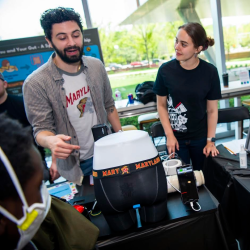Science Terp Yousuf Khan (B.S. ’18, Biological Sciences) Named 2019 Knight-Hennessy Scholar
The program, which selected 69 students out of 4,424 applicants in 2019, will fully fund Khan’s graduate study at Stanford University
University of Maryland alumnus Yousuf Khan (B.S. ’18, biological sciences) has been named to the 2019 cohort of Knight-Hennessy Scholars, a prestigious award that includes full funding for graduate study at Stanford University.
 “I’m very excited about this award because of the chance to work with the other Knight-Hennessy Scholars on great interdisciplinary projects that I wouldn’t be able to do otherwise,” said Khan, who plans to pursue a Ph.D. in molecular and cellular physiology at Stanford. “Plus, my sister lives very close to Stanford, and it will be great to be near family.”
“I’m very excited about this award because of the chance to work with the other Knight-Hennessy Scholars on great interdisciplinary projects that I wouldn’t be able to do otherwise,” said Khan, who plans to pursue a Ph.D. in molecular and cellular physiology at Stanford. “Plus, my sister lives very close to Stanford, and it will be great to be near family.”
The Knight-Hennessy Scholars program—the largest fully endowed scholars program in the world—received 4,424 applications and selected 69 students from around the world in 2019. The program aims to develop an interdisciplinary community of future global leaders to address the world’s most complex challenges through collaboration and innovation.
“Yousuf’s accomplishment in becoming the University of Maryland’s first Knight-Hennessy Scholar is built on years of highly productive research in labs, in addition to his exceptional commitment to helping others achieve their own goals as a tutor, teaching assistant and community leader,” said Francis Duvinage, director of the National Scholarships Office in the Office of Undergraduate Studies at UMD.
Khan will go to Stanford from Cambridge University, where he is pursuing a Master of Philosophy degree in pathology as a Churchill Scholar. At Cambridge, he continued his undergraduate research into programmed ribosomal frameshifting in eukaryotic organisms. This mechanism allows organisms to pack a larger amount of genetic information into a relatively short sequence of RNA. Although common in viruses, programmed ribosomal frameshifting has yet to be confirmed in humans.
“What I’ve done in the past year is use computational biology to search the human genome to find whether our cells can perform this frameshifting under normal circumstances,” said Khan, who currently works in the laboratory of Andrew Firth, a Wellcome Trust Senior Research Fellow in the Department of Pathology at Cambridge University. “We have a couple of good hits that I’m following up on now.”
As a UMD undergraduate, Khan spent three years in the laboratory of Jonathan Dinman, chair of the UMD Department of Cell Biology and Molecular Genetics, studying ribosomal frameshifting and how non-coding RNA controls gene expression. Khan cloned sequences suspected of being able to reprogram the genetic code and determined whether the sequences had the frameshifting function. As a result, he validated several new frameshifting sequences and co-authored five peer-reviewed journal articles and spoke about his findings at the American Association for Cancer Research’s annual meeting in 2017.
In 2018, Khan joined the laboratory of UMD Department of Cell Biology and Molecular Genetics Professor Norma Andrews to study Leishmania parasites, which are found in parts of the tropics, subtropics and southern Europe. They can cause serious disease and even death. Khan published a first-author paper in the journal Parasitology Open in November 2018 that showed a role for reactive oxygen species, such as hydrogen peroxide, in Leishmania parasite virulence.
Other awards Khan has received include a National Science Foundation Graduate Research Fellowship, a Barry Goldwater Scholarship, a Howard Hughes Medical Institution Research Fellowship, the Dr. Norman Laffer Scholarship and two Maryland Summer Scholars research fellowships. Khan was also a member of the Integrated Life Sciences program in the Honors College and a Banneker/Key Scholar at UMD.
###
The research paper, “ROS regulate differentiation of visceralizing Leishmania species into the virulent amastigote form,” Yousuf Khan, Norma Andrews and Bidyottam Mittra, was published in the journal Parasitology Open on November 6, 2018.
Media Relations Contact: Irene Ying, 301-405-5204, zying@umd.edu
University of Maryland
College of Computer, Mathematical, and Natural Sciences
2300 Symons Hall
College Park, MD 20742
www.cmns.umd.edu
@UMDscience
About the College of Computer, Mathematical, and Natural Sciences
The College of Computer, Mathematical, and Natural Sciences at the University of Maryland educates more than 9,000 future scientific leaders in its undergraduate and graduate programs each year. The college’s 10 departments and more than a dozen interdisciplinary research centers foster scientific discovery with annual sponsored research funding exceeding $175 million.







